Steve Solomon

MMS '18
What do you do professionally?
I currently juggle two careers—one as a professional athlete (track and field) and the second as an Enterprise Associate with Uber Eats.
What is the most enjoyable part of your job?
The most enjoyable part of my athletics is pushing my body to its limits. There is nothing that I have done in my life so far that comes close to the grit required to run at the Olympic level over the 400m—which is known to be one of the hardest events in sport.
In simplicity, the 400m is an all-out sprint for 45 seconds. In such little time, my heart rate accelerates upwards of 200 beats per minute, my body produces so many byproducts during energy metabolism and muscle contraction that my blood turns acidic and my muscles struggle to contract. The margin of error is so small that it is almost non-existent, and it is this pursuit of excellence at the margin that I love most.
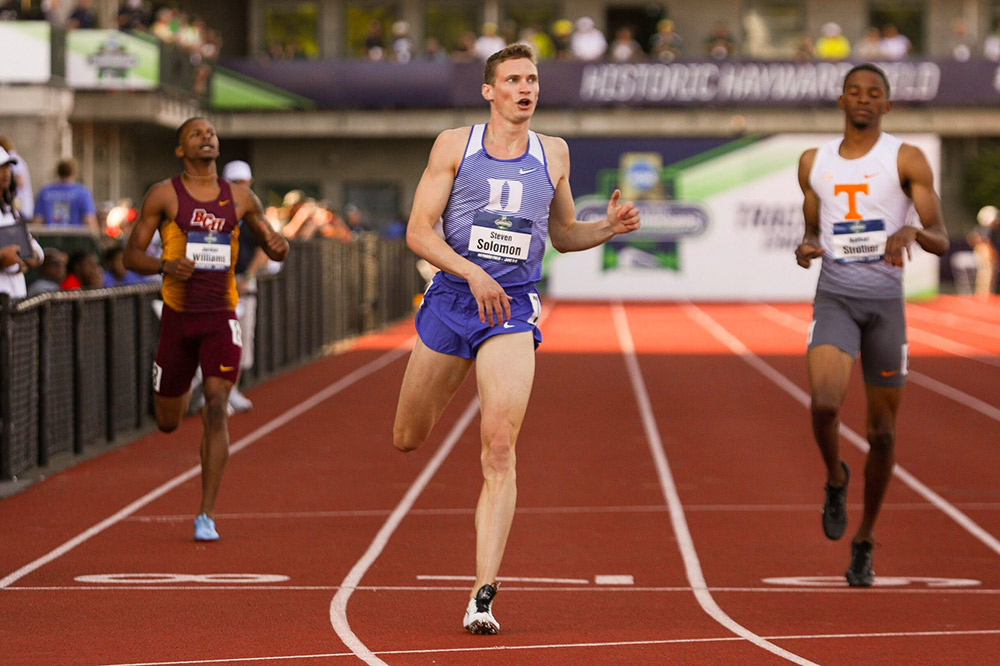
I know what you're thinking—how does this sound enjoyable!? This sounds like torture! But the magic, the joy, is in the pursuit of excellence at the highest levels. The mental fortitude and physical perseverance that I have developed through my athletic endeavors continues to be some of the most useful skills that I transfer to all parts of my life, professional and other.
The most enjoyable part of my role at Uber Eats is working with an incredible team of talented and motivated individuals who share a passion not just for the future of food, but also a desire to bring the best out of each other.
What is the biggest challenge you face?
Athletically, my biggest challenges are dealing with injuries and setbacks to my training and racing plans. By definition, my sport requires me to operate at 100% of my potential, and when you ride that edge, there are times when you tip into the red and have to reposition your approach. Equal to this is the challenge of trusting and believing that your team's plans are the correct path—in a sport that determines winners from losers by dividing seconds hundreds of times, there can be tense moments where you question if your path is the correct one. These battles make the sport intense, and at the same time, very strategic.
At Uber, my biggest challenge is adapting to the pace of the corporate sphere. The world moves at a different cadence in business than it does in the classroom, and I am really enjoying the challenge of understanding how different organizational units within a company operate in tandem to service the needs and dreams of our partners. Connecting the numerous stakeholders internal and external in my role is challenging, especially when dealing with differences in areas as complex as culture and as simple as time zones.
What sorts of interesting places has your position taken you? Do you have a favorite?
Given I'm only 6 months into my tenure at Uber, I have not travelled extensively in my role to date. My most frequent trips are from Sydney to Melbourne, and quarterly trips to New Zealand.
Athletically, I have been fortunate to travel extensively through Europe and Asia competing at the Olympic Games (London), World Championships (South Korea, England, Russia, Spain, and Canada), and the Commonwealth Games (Scotland). My favourite city that I've competed in is Barcelona—I adore the Spanish way of life; the busy nightlife, long days, delicious food, and love for soccer. I have also enjoyed the best pizza and pasta of my life in a small town in Spain called Murcia—a city I would not ordinarily have visited if not for a competition that I was invited to in 2016.
What is the best professional advice you've received?
I am incredibly grateful to have many caring and mentoring people in my life who bestow boundless wisdom and advice for my betterment. If I were to pick one piece of advice to share with Fuqua, it would be on the topic of hindsight bias.
After experiencing the incredible highs of reaching the Olympic final at the 2012 London Olympic Games as a 19-year-old, I was pained by the lowest of lows in 2016 when I missed out on qualifying for the Rio Olympic Games by 0.01 seconds. Yep, 1/100th of a second was the separating margin that forced me to watch the Olympics from my home in Sydney instead of competing out on the track in Rio.
When people hear this, they commonly remark condolences for raising the topic, for making me relive what must have been the most depressing moment of my life. While missing the Games was very painful, I can talk about it confidently and proudly knowing that I did everything that I could do with the information available to me at the time of making my preparations for those Olympics.
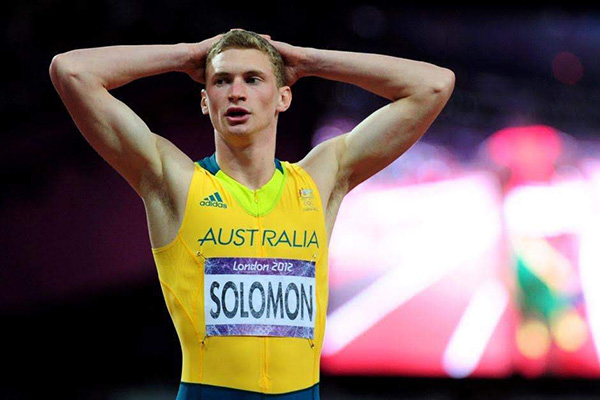
I took my Senior year off at Stanford (where I completed my undergrad) to move to the Australian Olympic Training Center in Canberra. I trained 2-3 times a day, often to the point of illness, in the quest for me and my team (coach, family, medical staff, friends, etc.) to reach the Games. I made tough decisions in pursuit of my goal, and while it did not come to bear fruit in my 2016 campaign, I did learn a lot from the journey. I can learn from this experience and openly assess it because I don't regret anything that I did.
Knowing what I do now (in hindsight), would I change anything if I could do it all again? Absolutely! But, knowing that I was acute to the decisions when they were present, and having evaluated each path with unemotional reality and consideration, I sleep easily knowing that I approached my 2016 Olympic campaign as well as I could.
Going forward, I will use those learnings in my approach to next year's 2020 Olympics in Tokyo, to again do the best that I can with the information available to me, today, to encourage my greatest chance of success towards my goals for the upcoming Games.
Aside from your current role, what is your dream job?
When I decided to pivot to business school from medical school, I did so upon the realization that the three most important elements of a job to me were:
1. That I work on complex and challenging problems. I don't find enjoyment in doing things that are easy, and integral to my happiness in the workforce is pushing myself to the limits through my work.
2. That I work with energetic and passionate people. I give a lot of energy to those around me, and I thrive off the synergy created by groups of energetic and passionate people approaching difficult problems together.
3. That my work has a meaningful impact on the lives of those around me. I am deeply motivated by people, and a dream job for me cannot have meaning unless it is connected to positively influencing those around me.
My dream job involves working on complex problems with passionate and energetic teammates, where I can have a positive influence on the people around me.
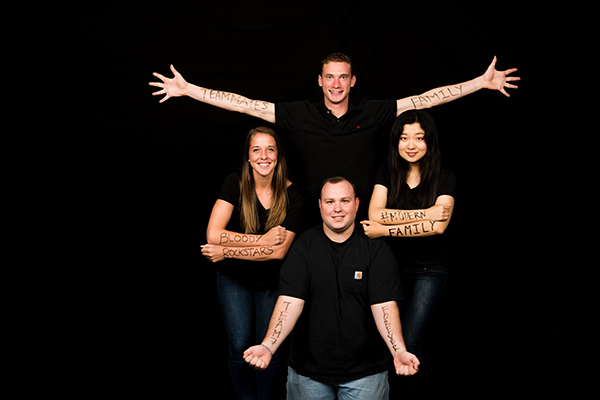
What do you like to do outside of work?
Outside of the office, you'll find me at Bondi Beach or Watson's Bay splashing in the ocean or sipping an extra hot mocha with friends. What's on my TV: Suits or Billions, or another viewing of The Italian Job or Forest Gump.
I'm a big reader, mostly non-fiction, and enjoy winding down each night by rotating through one of the five or six books that sit next to my bed. I love learning about psychology and sociology, and am often fixated on the topics of behavioral economics and decision making. If you have any recommendations, I would be grateful if you send them my way!
What is the most important thing you learned during your time at Fuqua?
The most important thing that I learned at Fuqua was the importance of profoundly caring about and understanding my teammates. Learning how each member of our team operates at a psychographic level as well as an interpersonal level turned out to be the secret to our very successful terms in Team 1 and Team 2.
Once we understood ourselves and each other, our efficiency and success as a group accelerated to great heights. I have carried this learning with me at Uber and in other parts of my life where I work closely with teams of people.
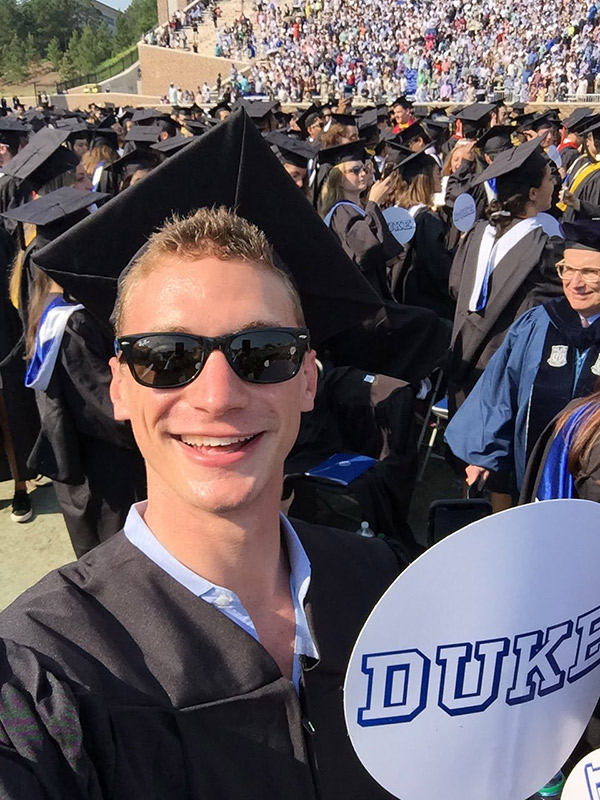
Who was your favorite professor?
I know that the question is posed in the singular, but if okay, I would like to highlight three professors who were very influential during my time at Fuqua.
First, Mark Brown [Communications]. Mark exampled "tough love", and I have tremendous respect for his degree of care and nurturing of our class throughout both Comm 1 and Comm 2. Mark pushed me in ways that I have not been urged before by a professor, and I still hear his voice in my head when I prepare presentations and talks. Mark is never afraid to tell you when things were terrible, but always offered a path to betterment. Thank you, Mark.
Second, Sharique Hassan [Strategy]. Sharique has an incredible degree of intellectual curiosity, and I have many fond memories of sharing conversations during office hours and analyzing situations or problems using different mental models and lenses of thought. In addition to his thoughtful questioning, I genuinely appreciate Sharique's care for his students, and I am thankful for the introductions that he helped me with during my time at Fuqua.
Lastly, Ryan McDevvit [Economics]. Ryan is one of the best teachers that I have come across in all my years of study. His class notes made me laugh out loud, and he very skillfully used humour and present-day examples to illustrate class concepts. From Ryan, I learnt through his example the importance of paying attention to the audience of your teachings, and to cater the direction of learning through their eyes as students, rather than your eyes as a teacher.
What is your favorite Fuqua memory?
I feel guilty for breaking the singular in the previous question, so while I would love to mention a host of memories, I'll stick to one.
My favourite memory at Fuqua was watching my teammates deliver our final presentation in Comm 1 (the outsource vs. organic assignment). I love this memory so much because it blended so many great memories into a fantastic performance by our team.
When I recollect to this memory, I think about the challenge to a group of five students from four different countries coming together to construct a rhetorical appeal that used both logical and emotional arguments to both arm and defend ourselves on both sides of the assignment.
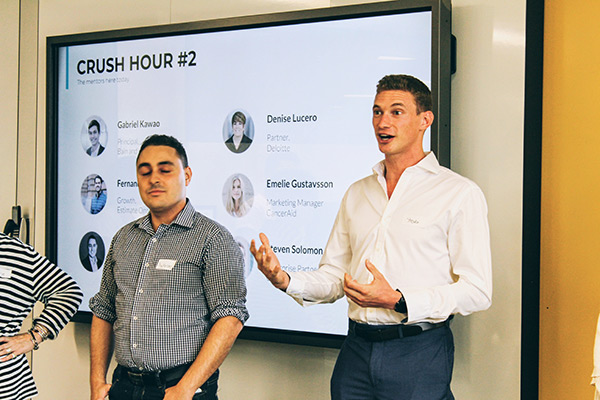
For those not familiar with the assignment, in short, we were to present a case to either invest organically in our company to grow a new business unit or to outsource the investment to another firm. The debate was against another team in the class, and a week after our initial presentations, we were forced to argue the opposite stance to our previous position.
Our team took enormous effort and pride in planning throughout the assignment on how we would utilize our individual strengths to deliver a knockout performance on both sides of the argument. We went above and beyond within our group to prepare, and watching it all come together during the final presentation brought me a deep feeling of euphoria. I am still tremendously proud of Jason Reid, Jatin Dahiya, Srinidhi Ranganathan, and Rina Okachi for the commitment and effort they contributed to this assignment and would like to publicly thank them here for giving me such a beautiful memory of Fuqua.
What does Team Fuqua mean to you?
Team Fuqua, to me, is all about bringing the best out of one another. Sharing success, together.
To truly bring your best, you need to be comfortable in your environment. You need to feel empowered to take risks, to challenge the status quo, to innovate, to fail, to be vulnerable to yourself and others. And to feel this level of comfort, you need to have impermeable trust in your environment; your teammates, your professors, your classmates, your resources.
To me, Team Fuqua is this environment—an environment where we succeed as individuals by encouraging and caressing a community of support, trust, and excellence.